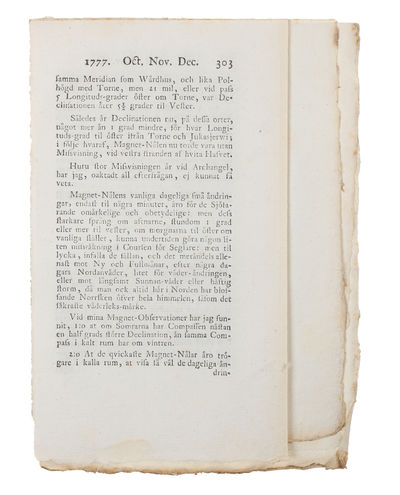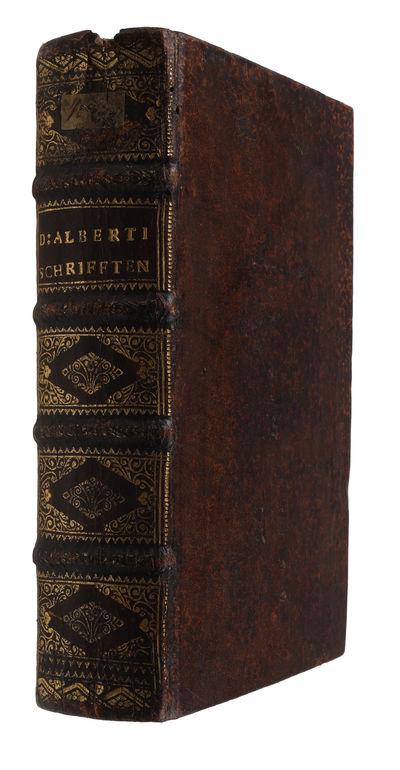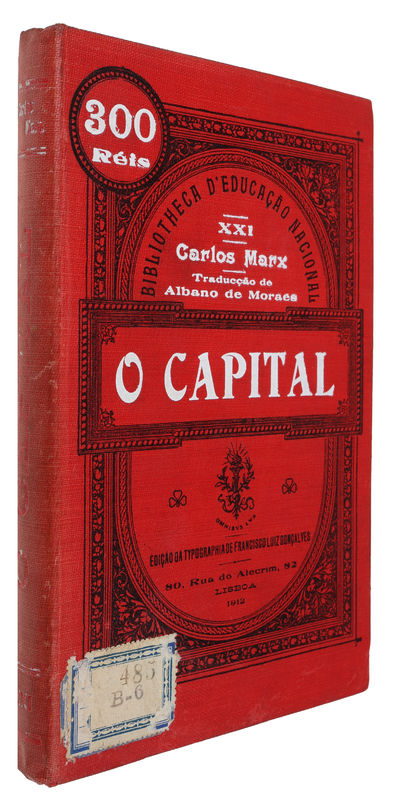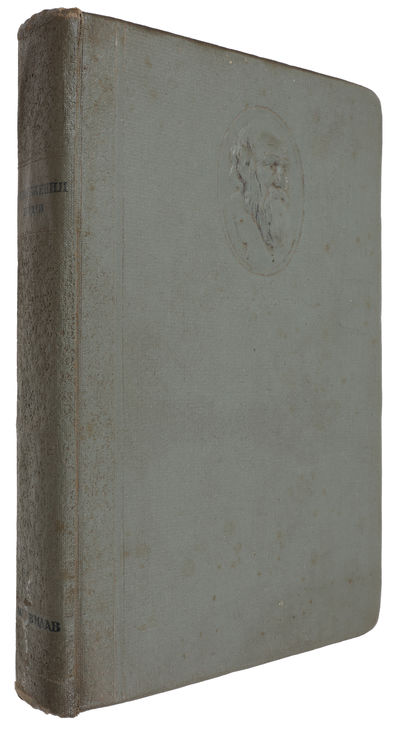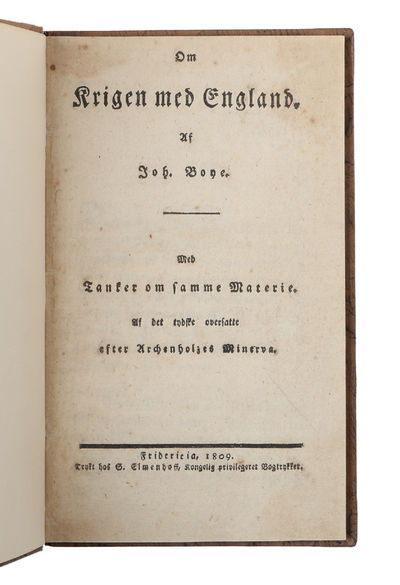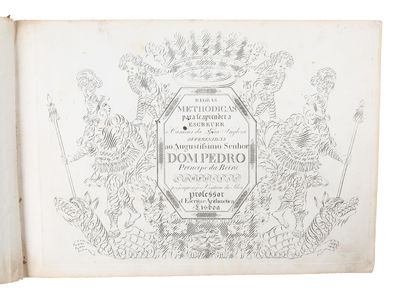GIULIANI, ANTONIO.
Saggio Politico sopra le vicissitudini inevitabili delle società civili. - [THE FIRST FORMULATION OF THE MALTHUSIAN THEORY OF POPULATION ]
Herman H. J. Lynge & Søn A/S
lyn55808
Vienna, Ignazio Alberti, 1791. 4to. Magnificent contemporary full mottled calf with richly gilt spine. gilt ornamental borders to boards and large oval centre-pieces, each encircled by a floriated gilt border, inside which a female figures of polished calf, in Roman style - presumably predicting Minerva (the goddess of wisdom and war) on the front and Juventas (the goddess of youth) on the back board. All edges of boards gilt and inner gilt dentelles. All edges gilt. Bound by G.F. Kraus of Vienna, with gold-stamped binder's signature to inside of back board. A bit of wear (mostly coming from the acid used to mottle the calf in the 18th century). A magnificent copy that is also internally in splendid condition. It is printed on thick, heavy paper and with wide margins. There's an elegant stamp to the title-page, a crowned monogram that we have not been able to identify.
Exceedingly scarce first edition - in a stunning binding - of the groundbreaking main work by Antonio Giuliani, in which he formulates his political and economic system, presenting his theory of population growth, which antedates Malthus' "Essay on Population" by seven years.This influential work actually constitutes the forerunner and the first formulation of The Malthusian theory of population and population growth, which had an immense impact on not only politics, economics and social sciences, but also on natural sciences. For instance both Darwin and Wallace considered the theory of population growth a main source in their development of the theory of natural selection.Malthus does not explicitly reference the work, but it is very likely that he read it. It was published in both Italian, German, and French - and apparently also in English as "A Political Essay on the Unavoidable Revolution incident to Civil Societies" (Molini, Paris, London, 1791) (see Watt: Bibliotheca Britannica) seven years before Malthus published his work, and it was reviewed in England the following year, where it was met with great critique - like some years later Mathus' "Essay on Population" would be too. "At a time when the science of politics is undergoing such extensive discussions, and when the improvement of our knowledge in the art of governing is sought practically, as well as in theory, this writer steps forward, and tells us that our reasoning is vain, and that our exertions are fruitless: that human wisdom and political fagacity neither impede nor hasten the fate of societies: that ministers and statesmen, who suppose that they govern the world, are mistaken, for the world governs itself: that there is a propelling force, of which politicians are ignorant, that drives all civil societies to their destruction; and that, from the excess of their strength, arises their decay: - in fact, that all our pretended knowledge is useless, if not hurtful; and that the science of legislation is like that of physic; its pretensions are quackeries, and its progress is marked with an increase of mischiefs, as a greater number of persons die since the art of healing has been practised. The mystery which our politician has developed amounts to this: that every country arrives in time to such a degree of population, that the produce of the ground is not sufficient to supply the wants of the inhabitants: the consequence necessarily is, that the nation is starved to death. - All the light, says he, that the most profound meditation on the nature of social bodies can furnith, must be reduced to this proposition, that there exists two classes of men, which ought to be exactly balanced: the one is the productive class, which furnishes the food by which life is sustained: the other is the consuming class, which exists only by the favour of the former. It is incontrovertible, then, that an equilibrium should be preserved between these two bodies; and that societies can flourish only while it remains unaltered. This fortunate state is of short duration: men multiply, without any law being provided to proportion their increase to their means of subsistence.This is the ground-work of our author's system, of which he afterward unfolds several parts. The inhabitants of cities, the monarch, the noble, the magistrate, the priest, the merchant, the soldier, the courtier, the man of letters, the artist, and all those whose industry and talents are employed in a thousand various manners, form the consuming class, and are, in fact, a heavy load, pressing down the farmers or cultivators of the ground, who are the productive class. ...In order to shew the danger resulting to society from an excess of population, and from the extension of commerce, (for this is also a doctrine held by our author,) he should have proved that there were more persons in existence than could have their wants supplied by the culture of the earth...He sees nothing but the approach of ruin in the increase of mankind; and the catastrophe of the tragedy must long since have been finished, had not Providence ordained that man, wanting, as in the case of other animals, a variety of different species to prey on his life, should take into his hands the work of thinning the world; and, by fighting, one against another, keep population within bounds; while, by destroying, from time to time, the superfluous number, he should make room for the entrance of fresh generations. - Hence, then, the utility and absolute necessity of wars!...Such is the ground-work and basis of Signor Guiliani's system: the superstructure is as perishable as the foundation is rotten: he has erected his house on the sand."(Contemporary review of the original and the French translation, in: The Monthly Review, Vol. IX, London, 1792, pp. 559-562). The work outlines a well-rounded system of politics and economics, at the core of which we have the theory of population growth."An important contribution to the history of political philosophy is made by two small works recently disinterred by Croce and composed 1791 and 1793 by an Italian of Trieste, Antonio de Guiliani, an Austrian subject who studied with an alert and unprejudiced mind the political and economic vicissitudes of Europe in the period between the enlightened despotism of Joseph II and the outbreak of the French Revolution. From his first writing, "Saggio politico sopra le vicissitudini inevitabili delle societa civili," Guiliani, who in his youth had shared in the generous illusions of illuministic rationalism, already appears disillusioned, as if he no longer believed in the power of reason to regulate and guide the course of human events. According to him, man believes that everything is guided by reason because he reasons on everything that happens. On the contrary, the forces that govern the interweaving of events are much more elemental and natural, and politicians are rather passive instruments than active artificers of the course of history. There is an elemental principle of life that regulates the life and death of social groups. This principle is as much hidden from politicians as the principle that animates living species in concealed from physicians. Man falls sick and dies despite the efforts of much vaunted science; and societies languish and die in spite of the efforts of politics and legislation. This principle consists in the fact that there exist two classes which ought to balance one another - the class that produces economic goods, and the class of consumers that only exists by virtue of the former, and which corresponds to a certain extent with the "sterile" class of physiocrats. As long as the two classes balance, society has a prosperous and harmonious life, and these conditions are usually found in the less progressive phases of an historical period when the mass of production sufficiently covers consumption. But in the periods that are generally considered most progressive, when population is rapidly increasing and great urban agglomerations begin to appear, Giuliani is on the contrary inclined to note a beginning of decadence and dissolution. "The equilibrium of the two classes begins insensibly to alter; men multiply without any restraining law to regulate the increase of population according to the means of subsistence. Instead the politicians hail with satisfaction the increase of population and do not perceive that in nature the various living species are balanced by mutual destruction, while man, with whom no other animal can enter into competition, is condemned to regulate his species himself, and to be the author of his own destruction." Hence revolutions, wars, commercial rivalries, and all those vicissitudes of human history that are usually named from their apparent causes, though they have at the same time a hidden reason disguised in the undeviating order of nature. The English reader will easily recognize here the characteristic traits of the doctrine of Malthus, but it is Malthusian doctrine "avant la lettre", as it antedates by seven years the famous "Essay on Population". There are wanting in Giuliani the mathematical determination of the two series, arithmetical and geometrical (which is anyway the most arbitrary part of the "Essay" of Malthus), and the council of moral restraint. Nevertheless, both authors are equally alive to the complex consequences resulting from the disproportion between population and the means of subsistence, and both have, as Croce says, "the merit of having considered not only the paradisiacal aspect of "crescite et multiplicamini", that of placid, increasing, and idyllic prosperity, but the demonic and revolutionary aspect as well." ... Finally we may note the characteristic that Giuliani, like Mathus, deduces from his economic principle a political attitude that is not only conservative but to some degree reactionary." (Guido de Ruggiero: Philosophy in Italy. In: Philosophy, Vol. 9, No. 34. (Apr. 1934), pp. 215-17).We have been able to locate only four copies of the true first edition (namely that in Italian, printed in Vienna) on OCLC and no copies at auctions whatsoever.Einaudi: 2603.
Exceedingly scarce first edition - in a stunning binding - of the groundbreaking main work by Antonio Giuliani, in which he formulates his political and economic system, presenting his theory of population growth, which antedates Malthus' "Essay on Population" by seven years.This influential work actually constitutes the forerunner and the first formulation of The Malthusian theory of population and population growth, which had an immense impact on not only politics, economics and social sciences, but also on natural sciences. For instance both Darwin and Wallace considered the theory of population growth a main source in their development of the theory of natural selection.Malthus does not explicitly reference the work, but it is very likely that he read it. It was published in both Italian, German, and French - and apparently also in English as "A Political Essay on the Unavoidable Revolution incident to Civil Societies" (Molini, Paris, London, 1791) (see Watt: Bibliotheca Britannica) seven years before Malthus published his work, and it was reviewed in England the following year, where it was met with great critique - like some years later Mathus' "Essay on Population" would be too. "At a time when the science of politics is undergoing such extensive discussions, and when the improvement of our knowledge in the art of governing is sought practically, as well as in theory, this writer steps forward, and tells us that our reasoning is vain, and that our exertions are fruitless: that human wisdom and political fagacity neither impede nor hasten the fate of societies: that ministers and statesmen, who suppose that they govern the world, are mistaken, for the world governs itself: that there is a propelling force, of which politicians are ignorant, that drives all civil societies to their destruction; and that, from the excess of their strength, arises their decay: - in fact, that all our pretended knowledge is useless, if not hurtful; and that the science of legislation is like that of physic; its pretensions are quackeries, and its progress is marked with an increase of mischiefs, as a greater number of persons die since the art of healing has been practised. The mystery which our politician has developed amounts to this: that every country arrives in time to such a degree of population, that the produce of the ground is not sufficient to supply the wants of the inhabitants: the consequence necessarily is, that the nation is starved to death. - All the light, says he, that the most profound meditation on the nature of social bodies can furnith, must be reduced to this proposition, that there exists two classes of men, which ought to be exactly balanced: the one is the productive class, which furnishes the food by which life is sustained: the other is the consuming class, which exists only by the favour of the former. It is incontrovertible, then, that an equilibrium should be preserved between these two bodies; and that societies can flourish only while it remains unaltered. This fortunate state is of short duration: men multiply, without any law being provided to proportion their increase to their means of subsistence.This is the ground-work of our author's system, of which he afterward unfolds several parts. The inhabitants of cities, the monarch, the noble, the magistrate, the priest, the merchant, the soldier, the courtier, the man of letters, the artist, and all those whose industry and talents are employed in a thousand various manners, form the consuming class, and are, in fact, a heavy load, pressing down the farmers or cultivators of the ground, who are the productive class. ...In order to shew the danger resulting to society from an excess of population, and from the extension of commerce, (for this is also a doctrine held by our author,) he should have proved that there were more persons in existence than could have their wants supplied by the culture of the earth...He sees nothing but the approach of ruin in the increase of mankind; and the catastrophe of the tragedy must long since have been finished, had not Providence ordained that man, wanting, as in the case of other animals, a variety of different species to prey on his life, should take into his hands the work of thinning the world; and, by fighting, one against another, keep population within bounds; while, by destroying, from time to time, the superfluous number, he should make room for the entrance of fresh generations. - Hence, then, the utility and absolute necessity of wars!...Such is the ground-work and basis of Signor Guiliani's system: the superstructure is as perishable as the foundation is rotten: he has erected his house on the sand."(Contemporary review of the original and the French translation, in: The Monthly Review, Vol. IX, London, 1792, pp. 559-562). The work outlines a well-rounded system of politics and economics, at the core of which we have the theory of population growth."An important contribution to the history of political philosophy is made by two small works recently disinterred by Croce and composed 1791 and 1793 by an Italian of Trieste, Antonio de Guiliani, an Austrian subject who studied with an alert and unprejudiced mind the political and economic vicissitudes of Europe in the period between the enlightened despotism of Joseph II and the outbreak of the French Revolution. From his first writing, "Saggio politico sopra le vicissitudini inevitabili delle societa civili," Guiliani, who in his youth had shared in the generous illusions of illuministic rationalism, already appears disillusioned, as if he no longer believed in the power of reason to regulate and guide the course of human events. According to him, man believes that everything is guided by reason because he reasons on everything that happens. On the contrary, the forces that govern the interweaving of events are much more elemental and natural, and politicians are rather passive instruments than active artificers of the course of history. There is an elemental principle of life that regulates the life and death of social groups. This principle is as much hidden from politicians as the principle that animates living species in concealed from physicians. Man falls sick and dies despite the efforts of much vaunted science; and societies languish and die in spite of the efforts of politics and legislation. This principle consists in the fact that there exist two classes which ought to balance one another - the class that produces economic goods, and the class of consumers that only exists by virtue of the former, and which corresponds to a certain extent with the "sterile" class of physiocrats. As long as the two classes balance, society has a prosperous and harmonious life, and these conditions are usually found in the less progressive phases of an historical period when the mass of production sufficiently covers consumption. But in the periods that are generally considered most progressive, when population is rapidly increasing and great urban agglomerations begin to appear, Giuliani is on the contrary inclined to note a beginning of decadence and dissolution. "The equilibrium of the two classes begins insensibly to alter; men multiply without any restraining law to regulate the increase of population according to the means of subsistence. Instead the politicians hail with satisfaction the increase of population and do not perceive that in nature the various living species are balanced by mutual destruction, while man, with whom no other animal can enter into competition, is condemned to regulate his species himself, and to be the author of his own destruction." Hence revolutions, wars, commercial rivalries, and all those vicissitudes of human history that are usually named from their apparent causes, though they have at the same time a hidden reason disguised in the undeviating order of nature. The English reader will easily recognize here the characteristic traits of the doctrine of Malthus, but it is Malthusian doctrine "avant la lettre", as it antedates by seven years the famous "Essay on Population". There are wanting in Giuliani the mathematical determination of the two series, arithmetical and geometrical (which is anyway the most arbitrary part of the "Essay" of Malthus), and the council of moral restraint. Nevertheless, both authors are equally alive to the complex consequences resulting from the disproportion between population and the means of subsistence, and both have, as Croce says, "the merit of having considered not only the paradisiacal aspect of "crescite et multiplicamini", that of placid, increasing, and idyllic prosperity, but the demonic and revolutionary aspect as well." ... Finally we may note the characteristic that Giuliani, like Mathus, deduces from his economic principle a political attitude that is not only conservative but to some degree reactionary." (Guido de Ruggiero: Philosophy in Italy. In: Philosophy, Vol. 9, No. 34. (Apr. 1934), pp. 215-17).We have been able to locate only four copies of the true first edition (namely that in Italian, printed in Vienna) on OCLC and no copies at auctions whatsoever.Einaudi: 2603.
Adress:
Silkegade 11
DK-1113 Copenhagen Denmark
Telefon:
CVR/VAT:
DK 16 89 50 16
E-post:
Webb:
![Saggio Politico sopra le vicissitudini inevitabili delle società civili. - [THE FIRST FORMULATION OF THE MALTHUSIAN THEORY OF POPULATION ] (photo 1)](https://d3525k1ryd2155.cloudfront.net/h/698/596/1132596698.0.l.jpg)
![Saggio Politico sopra le vicissitudini inevitabili delle società civili. - [THE FIRST FORMULATION OF THE MALTHUSIAN THEORY OF POPULATION ] (photo 2)](https://d3525k1ryd2155.cloudfront.net/h/698/596/1132596698.1.l.0.jpg)
![Saggio Politico sopra le vicissitudini inevitabili delle società civili. - [THE FIRST FORMULATION OF THE MALTHUSIAN THEORY OF POPULATION ] (photo 3)](https://d3525k1ryd2155.cloudfront.net/h/698/596/1132596698.2.l.0.jpg)
![Saggio Politico sopra le vicissitudini inevitabili delle società civili. - [THE FIRST FORMULATION OF THE MALTHUSIAN THEORY OF POPULATION ] (photo 4)](https://d3525k1ryd2155.cloudfront.net/h/698/596/1132596698.3.l.0.jpg)
![Saggio Politico sopra le vicissitudini inevitabili delle società civili. - [THE FIRST FORMULATION OF THE MALTHUSIAN THEORY OF POPULATION ] (photo 5)](https://d3525k1ryd2155.cloudfront.net/h/698/596/1132596698.4.l.0.jpg)
